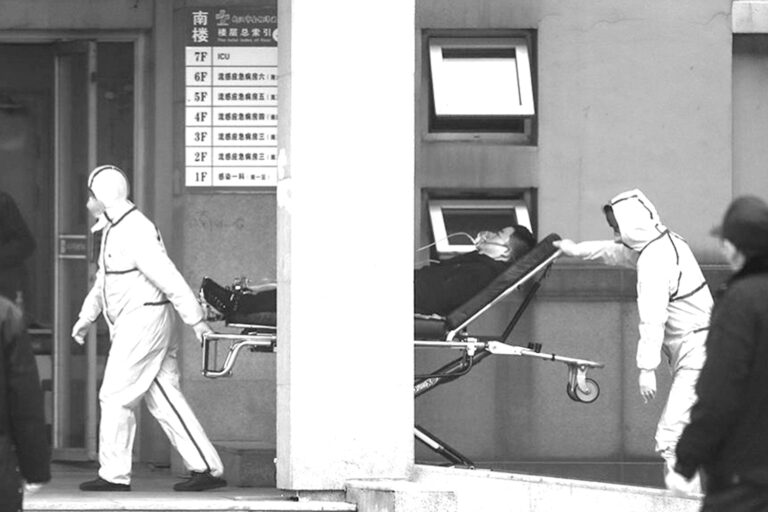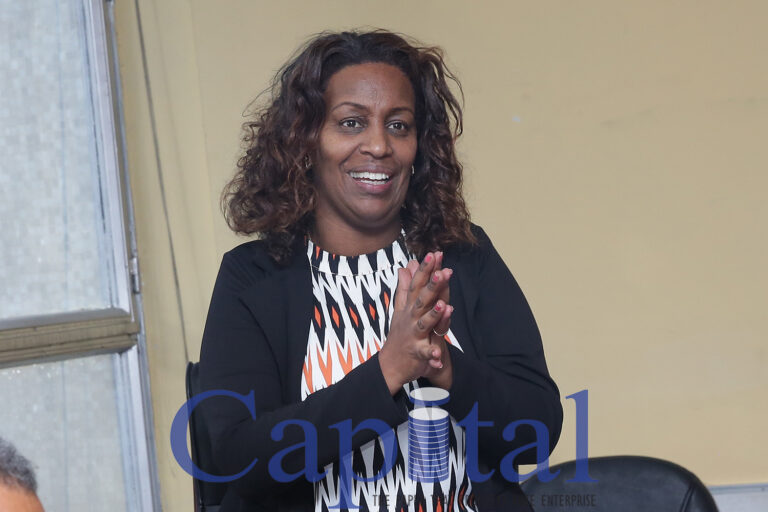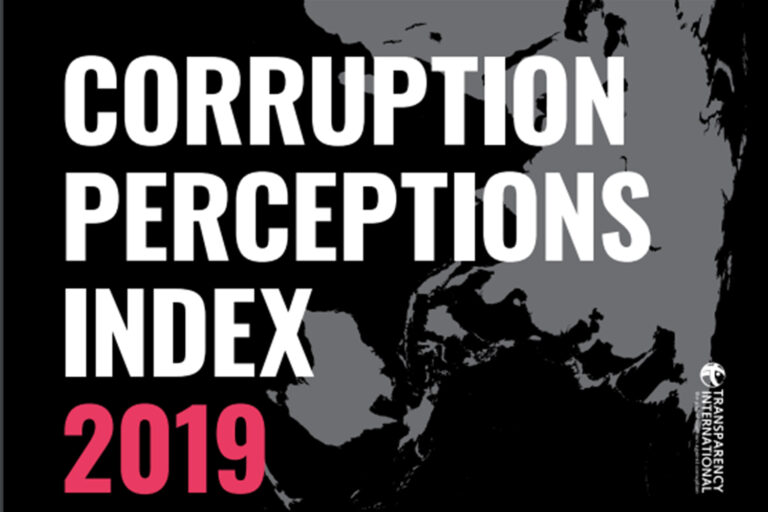By Ruth Brook
The Ethiopian Public Health Institute (EPHI) announced that screening for the new coronavirus (2019-nCoV) will commence at Addis Ababa Bole International Airport. This is following the recent outbreak of the virus that hit China, which has taken 26 lives and infected more than 900 individuals.
All passengers arriving in Bole International Airport will go through body temperature screening; it was announced at an EPHI press conference on January 24th 2020. Entry points throughout Ethiopia will observe a similar screening process.
Airports around the world have taking similar precautions to curtail this outbreak as they are seeing an influx of Chinese passengers due to the fast approaching Lunar New Year.
The coronavirus can cause mild to severe respiratory illness. Symptoms include fever, cough, shortness of breath and difficulty breathing; it is transferred from animals to humans. The virus appears to have originated in Wuhan, China at a seafood market and continues to spread throughout China. While the majority of reported cases come from China, the United States, Japan, Thailand, South Korea and Singapore have also reported infections.
Ethiopian Airlines currently operates daily flights to China in Guangzhou and Beijing and flights three times a week to Chengdu. The flag carrier also operates daily passenger and cargo flights to Hong Kong Special Administrative Region and Shanghai. Ethiopian Airlines recently announced interest in opening up routes to three more Chinese cities namely Chongqing, Shenzhen and Zhengzhou.
The World Health Organization (WHO) has declared the outbreak an emergency in China but has stated that it is too early to deem it a global health emergency.
What’s the best thing you can do to protect yourself from Coronavirus
The new coronavirus has not yet reached the deadly rates of its predecessors, SARS and MERS, however, the sooner the outbreak is contained the better for countries around the world, say Dr Michael Curry, clinical associate professor, and Marion Koopmans, Dutch expert on animal-related infections.
The deadly coronavirus has claimed the lives of 26 people and infected more than 880 others in China after being detected in Wuhan in late December. The news about the new virus outbreak immediately caught the headlines evoking the memory of the fuss surrounding the African continent’s Ebola epidemic that was later called disproportionate.
Dr Michael Curry, a clinical associate professor at the University of British Columbia’s Department of Emergency Medicine, explains that the Wuhan coronavirus is not something fundamentally new and while one needs to stay alert there’s no need to go into full-blown panic mode.
“Coronaviruses are a family of respiratory viruses, and most of us have had a coronavirus infection at some point in our life as somewhere around 10 percent of ‘common colds’ are caused by members of the coronavirus family”, the academic says, admitting that, unfortunately, some varieties of coronaviruses can be deadly.
Dr Curry recollects that the coronaviruses SARS and MERS (Middle Eastern Respiratory Syndrome) killed 10 and 36 percent of the people they infected, respectively.
“This is a new virus”, he notes referring to the Wuhan coronavirus. “We didn’t know it existed a month ago, so there’s much that we don’t know about it-and some of the things we think we know about it are probably wrong. That being said, we’re looking at a mortality rate around 3 percent”.
The professor elaborates that the virus in question will most likely be “more dangerous to older people, people with other illnesses, and people with a compromised immune system”.
Having said that coronaviruses are spread by droplets, Dr Curry recommends that the best thing one can do is wash one’s hands and avoid touching one’s face to prevent the virus from getting into one’s respiratory passages. While there’s a suggestion that coronaviruses may be airborne, it is still unclear whether the Wuhan virus can be spread that way, he notes.
“The most worrying thing is how fast this virus seems to be spreading”, the academic stresses. “As of today, China is reporting 800 cases but with the virus having already spread to five countries I suspect way more than 800 people have been infected”.
The good news, according to the professor, is that “outbreaks like this usually seem worse at the beginning than what they turn out to be”.
“When the H1N1 pandemic swine flu virus first appeared in Mexico in 2009 initial reports were horrifying. Figures of 50 percent mortality were being tossed around… [However], the overall mortality rate of that virus ended up being well under 1 percent”, Dr Curry underscores.
Marion Koopmans, DVM, Ph.D., an expert on animal-related infections (zoonoses) at the Erasmus Medical Centre in the Netherlands, praises China’s capability of detecting an endemic in its early stages, and containing outbreaks of diseases while they are still small.
“China through its surveillance of pneumonia was able to detect this outbreak and find the cause in a very short period of time, which shows how well their surveillance works”, she recalls. “It also shared the first information on the virus which helped other countries prepare. That is why cases were detected in travellers to other cities in China and in other countries”.
Commenting on the origins of the new virus she notes that it most likely came from bats but possibly from other animals, at a market in Wuhan.
According to Koopmans, it still needs to be determined how exactly the infection spreads and “how easily it does that”.
“It is clear that in some situations the virus can be transmitted between people and there is concern that the virus can spread further when the holiday season starts”, she notes. “Some cases have been detected in travellers from Wuhan. From what we know so far, we know that people infected can have mild disease or more severe illness, with pneumonia that in some cases can be fatal”.
While ten cities in China’s Hubei Province officially announced the suspension of transport connections over the virus outbreak, the World Health Organisation (WHO) reported Thursday that it was too early to declare a global emergency over China’s coronavirus (2019-nCoV).
Screening for coronavirus begins at Bole International Airport
Oxfam’s inequality report calls for abolishment of biased economic system
By Ruth Brook
”The combined wealth of the world’s 22 richest men is more than the wealth of all the women in Africa.” This was one of many unsettling realities revealed in Oxfam’s annual global inequality report, released Monday.
The 2020 report titled “Time to Care – Unpaid and underpaid care work and the global inequality crisis” communicated the current global economic imbalances and the reasons behind them. Oxfam released “Time to Care” on January 20th, 2020 ahead of the World Economic Forum in Davos, Switzerland.
As the title suggests, the report addressed the burgeoning gap between the worlds rich and poor, stating that in the shadows of economic inequality exists gender inequality – one of the main causes for the great divide. The charity coined the dire situation “a tale of two extremes.”
Also contributing to the aforementioned gap is an economic system which overlooks an essential work sector – domestic and care work done by girls and women around the world, who make up some of the world’s most exploited workers.
Care work is not limited to daily domestic work; it encompasses looking after children, elderly people and those with physical and mental illnesses and disabilities. The predominately female sector is severely under looked; women in rural communities and low- income countries spend up to 14 hours a day on unpaid care work, five times more than males in the same communities.
Furthermore, approximately 50 percent of domestic workers lack minimum wage protection and more than 50 percent have no legal limits on their working hours.
Existing efforts which tackle inequality and the mistreatment of care workers were also mentioned in the report. Lebanon-based, Ethiopian organization Egna Legna was one such example. Egna Legna is an Ethiopian union of domestic workers and activists calling for an end to the unjust Kafala system that exists in the Middle East, a system which enables employers’ abuse of domestic workers.
An analysis of the global economic pyramid shows titanic wealth held in the hands of an iota of the world’s population. In 2019, the world’s billionaires, only 2,153 people, had more wealth than 4.6 billion people; the majority of the privileged cohort is made up of men.
“The world’s richest 1% have more than twice as much wealth as 6.9 billion people.”
Meanwhile, half of the world’s population lives on less than $5.50 a day. The contrast between the extreme poverty at the bottom of the pyramid and the trillions of dollars at the top has called for an abolishment of billionaires, as the number of billionaires has doubled in the last decade.
“Getting the richest one percent to pay just 0.5 percent extra tax on their wealth over the next 10 years would equal the investment needed to create 117 million jobs in sectors such as elderly and childcare, education and health,” said Oxfam India CEO, Amitabh Behar, in a press release regarding the release of the report.
The 63 page report concluded on a hopeful note, stating that a fairer world is possible, provided government commitment and cooperation. The primary solutions to the current grave situation are to eradicate the sexist economic system in place and to do away with the increasing number of billionaires. These solutions were supplemented by Oxfam’s suggested six courses of action.
The first is to invest in “national care systems” which will work to resolve the uneven responsibility for care work done by women and girls. The second course of action suggests that in order to eradicate extreme poverty, extreme wealth must be tackled first; it is up to the government to close the divide by fairly taxing wealth and high incomes.
Next is having the government involve unpaid care-workers in policy making. The penultimate suggestion is to challenge norms that see care work as the responsibility of women and girls. Lastly, the report stated that businesses should see the value of care work and prioritize the well-being of workers.
“Governments created the inequality crisis —they must act now to end it,” said Behar.
Service to start direct procurement
Public Procurement and Property Disposal Service (PPPDS) has targets to commence direct procurement cutting out middle men on some strategic commodities to tackle challenges that it currently faces.
The Service that is responsible to buy massive federal service and commodity products is currently undertaking the procurement process via international bid that will entertain anybody to involve in the bidding process.
That means suppliers, agents and other third body involve on the bid and shall supply products which are procured from direct producers.
“Such process forced us not to get real price or the price of products will unnecessarily rise because players are not original sellers,” said Tsewaye Muluneh, Director General of PPPDS.
“Traders or brokers that currently supply products add commission on the price,” she added.
Besides that the current way of procurement takes time since it is undertaking on bid, according to Tsewaye.
To solve such challenges the government now preferred to undertake a direct procurement from governments of major suppliers mainly on wheat.
According to Tsewaye, few weeks ago a delegation comprised from relevant government offices and public enterprise have paid a visit in three countries and met government officials there to explain the strategy that the Ethiopian government plans.
A delegation led by Eyob Tekalgne, State Minister of Finance, that include heads of PPPDS, Ethiopian Trading Businesses Corporation, Ethiopia National Disaster Risk Management Commission and advisor of the State Minister visited Australia, Russia and Ukraine and undertook government to government (G2G) meeting.
The main visit of the delegation focus on the process of buying wheat, which is one of the major strategic product the government by every year by allocation of over a half billion dollar.
The aim of the visit is to buy commodities from governments directly that will cut the commission that currently traders add now, according to Tsewaye. “This new strategy will also allow keeping the supply products on continual manner and it is time saving,” she told Capital.
Eyob, who meet with media on Friday January 17, said that the government does not have a plan to continue to import wheat from abroad that will be fully covered by local sources in the coming two years.
“While we shall buy the grain on the G2G manner since we do on other procurements like fuel,” he added.
The bid process needs time that might be followed by claims, which will also include court case, on the bid process, according to the head of PPPDS.
“If we manage direct procurement we shall solve these long processes,” she explained.
“On our visit we have expressed our interest for the stated countries government officials besides observing experiences there,” she added.
PPPDS targets to improve its operation by introducing modern procurement experience adopting from others. Currently it is working with Ministry of Innovation and Technology to come up with automated procurement process that will replace the current manual process.
Tsewaye said that the procurement process of other countries is automated and that makes their activity fast and easy.
Corruption levels remain high
By Ruth Brook
Ethiopia’s corruption levels have seen an unremarkable change in the last year, according to the 2019 Corruption Perceptions Index (CPI) by global anti-corruption organization, Transparency International. The widespread theme of the report was one of stagnation; more than two thirds of countries listed -many of which are among the worlds most advanced economies – have remained stagnant or have experienced backsliding.
The basis of this year’s research is the relationship between politics, money and corruption, the report revealed.
The index ranks 180 countries and territories on a scale from 0-100, with countries scoring closer to 0 labeled as “highly corrupt” and countries closer to 100 as “very clean”. The lower the score, the more corruption the country experiences.
Ethiopia scored 37/100 in 2019, ranking 96th out of 180 countries and territories. The recent score is an insignificant increase from the 2018 score of 34/100, ranking 114th out of 180. Countries are ranked by their perceived levels of public sector corruption.
Data following Ethiopia’s corruption levels have shown that continuous violation of human rights have resulted in the country’s continued low score and have caused “widespread unrest” since 2015. A 2018 report by Transparency International stated that corruption in Ethiopia “ranges from petty to grand and acts as an impediment to its development and further exacerbating poverty.”
Ethiopia’s score is seemingly a reflection of its continents status with the report showing a majority of countries in Africa scoring below 50. The lowest scoring region was discovered to be Sub Saharan Africa with an average regional score of 32/100 which was a stark contrast to the highest scoring region, Western Europe and the European Union, with an average score of 66/100.
According to the results, corruption is more prevalent in countries where large sums of money seamlessly flows into electoral campaigns and where the country’s wealthiest have influence over the governments decision-making.
Since 2012, only 22 countries have significantly improved their CPI scores, in the same breath, 21 countries have seen a significant decline in their scores since 2012.
The 34 page report concluded with recommended solutions by Transparency International for countries and territories suffering from low scores. Among the recommendations are strengthening electoral transparency and integrity, empowering citizens to exercise their voices, monitoring political financing of campaigns and reducing unnecessary influence in policy-making.
Transparency International is a nongovernmental organization, based in Berlin Germany, which seeks to combat global corruption. The first Corruption Perceptions Index launched in 1995, two years after the organization was founded. Transparency International is now present in more than 100 countries, working “relentlessly to stir the world’s collective conscience and bring about change.”





